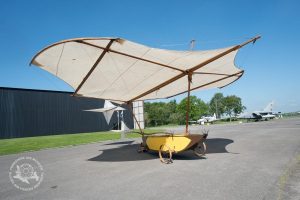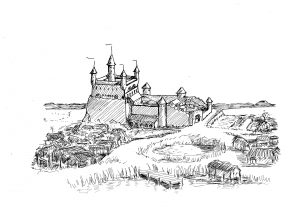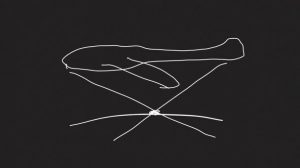 Illusion: It’s funny sometimes how story ideas come about. I saw one programme (Bargain Hunt) talking about George Cayley, aviation pioneer born in the 18th century, and then a news piece about the anniversary of the RAF, interviewing one of the crew on the most famous bombing raid in the war. A couple of hours later I was writing this story.
Illusion: It’s funny sometimes how story ideas come about. I saw one programme (Bargain Hunt) talking about George Cayley, aviation pioneer born in the 18th century, and then a news piece about the anniversary of the RAF, interviewing one of the crew on the most famous bombing raid in the war. A couple of hours later I was writing this story.
Time for some more tech talk with Fred & George. This 2000-word story is set after the time of The Princelings of the North, in fact I’ve had to remove a couple of spoiler paragraphs. It didn’t really need them, but if I include this in the Chronicles of Marsh, they’ll probably go back in.
Master of Illusion
“People are worried, George. They’re saying that flying is dangerous. Nobody wants to fly anywhere now.”
“But that’s just silly! People have been flying around in the older planes without any accidents. We trained the pilots, they’re all licensed, we inspect the maintenance records, we do everything…”
“Of course you do.” Fred was used to smoothing George’s ruffled feelings. “They are just nervous. Too many accidents recently. They don’t understand why, and they don’t think ‘progress’ is all it’s made out to be.”
“Some people, yeah.” George flumped in his chair and kicked the footstool.
Fred raised an eyebrow. For George that was a serious display of temper.
The latest accident had occurred with Prince Miles at the helm. Miles had been the first flyer in the Realms. He had been the one to bring the first flying machine over from the continent. Fred smiled, remembering how Miles had delivered Kira to Buckmore a few days before Lupin and Nerys got married. That was the day George’s life had changed completely. He had nearly invented the strawberry juice power plant—now known as the fuel cell—and along had come another machine, much more glamorous and just as useful.
And then the pair of them, with Prince Lupin and Lord Smallweed, now disgraced, deposed and in exile, had hit upon the plan to develop a way of flying stocks of Vex across the great Western Ocean and bringing back stocks of Wozna Cola. Just as they had promised when they got Hugo to close the time tunnel.
As if he had been reading Fred’s thoughts, George broke in on them. “The trouble is, I have to keep going with this line of propellors. We’re so close to getting the power-lift-efficiency ratios just right. “
“Why are the accidents happening? I know you said the landing levels aren’t right, but why is that only the new propellors. What’s so different with landing with the old ones?”
“It’s so much more difficult to see how far you are above the surface. The barometers don’t help, not when you are nearly at ground level.”
“And you can see okay with the old propellors working?”
“Yes. I think they don’t distort the wind-rush close to the pilot so much. The new ones make you see things magnified, or smaller, or something.”
“So if you had a way of telling how high you were above the water without actually looking out, it would be fine?”
George nodded. He moved the footstool nearer and set his feet on it.
“You can’t mount a mirror or something beside the cockpit?”
George shook his head, then scratched it. “Well, it’s a question of calibration. I wonder…”
Fred let him wonder; he watched him stare into the fire, then get up, find some paper and a pencil, and start squiggling.
 Fred left George to it, and walked up to the battlements to look at the view. He passed a couple of kids racing around the top of the castle walls. When he was a kid these parts of the castle were off limits. It was strange, his grandfather had crowded a lot of people into the castle, yet it never seemed this busy. Then they all left when he died, and by the time Fred inherited, the place seemed nearly deserted. What was it with folk? Ludo was now lord of Castle White Horse, and apparently people were flocking to him there. Yet they’d run a mile when he became king of Marsh.
Fred left George to it, and walked up to the battlements to look at the view. He passed a couple of kids racing around the top of the castle walls. When he was a kid these parts of the castle were off limits. It was strange, his grandfather had crowded a lot of people into the castle, yet it never seemed this busy. Then they all left when he died, and by the time Fred inherited, the place seemed nearly deserted. What was it with folk? Ludo was now lord of Castle White Horse, and apparently people were flocking to him there. Yet they’d run a mile when he became king of Marsh.
He stared out towards the Big Water, a broad sea-fed inland lake to the south. The sun was setting over his right shoulder, and darkness was already creeping in over the sea on his left. Save for two white spots. He frowned. They were too low for stars. One was directly east of him, the other a couple of points away, but they were keeping pace with each other. He remembered one of Willoughby’s stories about the Diamond Souls, and smiled wistfully, thinking of people who might be diamonds in the sky now.
The white spots were getting closer and not moving relative to the lumps and bumps of the dark dunes in the distance, so coming straight at him.
“Willoughby!” He hoped his steward was in earshot.
“Yes?”
“How do you do that? Never mind,” he added as Willoughby started to attempt an explanation of how he was beside Fred whenever he called. “Have you seen those lights?”
“Ah… yes. Probably coming back from the Continent.”
“Are we expecting them?”
“I believe so.”
“Am I expecting them?”
“Ah, sorry, no, George is expecting them and it should lift his spirits, I think.”
“You know the Council wants to ban flying over water.”
“Yes, I heard. Silly, really, since it’s safer over water, if anything. With any luck Pippin will have brought someone back to help.”
“Why are there two planes?”
“Saves Pippin taking her back again. She can fly herself.”
“Her? Don’t let Jasmine meet her, then.”
“I’m afraid it’s too late for that. Your daughter has known her for years.” Willoughby hid his desire to giggle at Fred’s shocked expression. “Ah, they are turning in to land, I think.”
Fred watched the lights move to the left, then one turned away to go around in a circle, letting the other start towards the broad water channel the Marshfolk had built away from the farmland. The black shape of the flying machine became apparent behind the light on the nose, and Fred noticed another light underneath, flicking a pool of light over the ground, glinting across ditches. The pool got larger as the plane sank towards the surface and then landed in a susurration of spray on the water. Fred never tired of watching these flying boats land. He saw the floating machine continue on its way and turn into the channel to the dock. Then the second plane repeated the performance.
Fred sighed. He heard a ripple of applause from the northern wall. A crowd had formed for the evening’s entertainment. Two smooth, untroubled, well-judged performances. If only Prince Miles had succeeded as well. But then, it was a quiet, clear night, with no wind to whip up waves on the surface.
“Waves on the surface make it easier to judge the height,” said Willoughby. Fred jumped. He’d forgotten Willoughby was there.
“Why did Miles misjudge it, then?”
“We need a foolproof way of knowing when they are down to the right height. The new propellors create an illusion.”
“How do you know?”
“You ought to know I am the master of illusion.”
Fred stared at his steward. Of course he was. Fred had seen Willoughby create illusions of being in different places when he was telling stories, in front of the audience one moment, crowing like a cockerel from the battlements the next. Disappearing entirely sometimes.
“Could you do something to help them?”
Willoughby looked at the lights on the flying machines bobbing as they moored at the landing stage. “Let’s see what Solveig has to say on the subject first. And it’s stuffed pepper for dinner, cook said.”
“Oh, yummy. Stuffed peppers!”
…
Despite their long journey from the Rhinelands, Solveig and Pippin were keen to talk solutions that evening. George called in Geoffrey, one of his top engineers, and Sally, Oscar and Joshua from his project group to the workshop to discuss ideas. Willoughby went too, at Fred’s request.
“Why a steward?” Solveig asked.
“I am not just a steward,” Willoughby replied.
“He often says enigmatic things like that, Solveig,” Pippin said. “We just ignore him. But it’s true, Willoughby is not ‘just’ anything.”
Solveig studied Willoughby for a moment, then turned back to the scrolls she’d laid out on the worksurface.
“So, we have this problem with the downdraft from the new propellers. You see the interference with lift; the turbulence then created, turns here under the body, and with the loss of height—“
“—it creates a false sense of landing!” George got it immediately.
“Exactly.” Solveig looked at the others, and explained it in more detail until everybody nodded.
“We tried mirrors on the wings, but couldn’t make that work. Too difficult to see the surface and work out angles.” Pippin tapped the positions on the wings and drew imaginary lines between surface, wing and pilot.
“Indeed. We had some success with calibration, but not enough.” Solveig agreed
Rosemary offered another solution they’d tried, and Oscar another.
“The trouble is, we still get an uncertainty area of about five to fifteen metres, when we don’t know whether we are at sinking level or not.” Geoffrey explained, ‘sinking level’ being the point at which they could let the boat glide through the air to land on its belly on the water.
“Does it help if you move the new propellors further from the body?” Willoughby asked.
Solveig shook her head.
“The trouble is, the wings then need to be longer, which creates problems for weight and drag.” Pippin added.
“I was thinking… why do you use that down light at the front?”
“To spot the surface, of course.”
“But you can’t tell how far the surface is below you?”
“Not within five metres, no.”
“I have an idea.”
…
 Two days later, George called Fred down to his workroom to show him the principle of the landing lights, drawing the outline of a plane on a blackboard. He drew a line from the underside of the nose at an angle underneath the body, and another from the underside of the tail, pointing down and forward, so that the two lines crossed.
Two days later, George called Fred down to his workroom to show him the principle of the landing lights, drawing the outline of a plane on a blackboard. He drew a line from the underside of the nose at an angle underneath the body, and another from the underside of the tail, pointing down and forward, so that the two lines crossed.
“What we have here is the new ‘crosslight altimeter’. If you know the angles of the lights, and the distance between them, you can work out what height you are at when the two coincide. Here, hold this.” He passed Fred a directional lamp, took one himself, turned it on and pointed it at an angle on the floor. “Turn yours on. Shine your spot at mine. There you go. When they overlap, you know you are here.” He turned back to his diagram and drew a line through the point where the downward lines met.
“But that’s all you know. If we put a bar on mine like this,” he fixed a cap over his light which let all the light through save for that covered by a horizontal bar, and then one the same over Fred’s, save that the bar was vertical. “Now shine them together.”
A crossbar, with vertical and horizontal axes, showed in the single spot made by both lights shining together.
“Now, if we simulate going too low, your vertical bar goes ahead of my horizontal one. And if we’re too high, my horizontal one is ahead. We can calibrate those so the pilot knows how high they are.”
A round of applause rippled around the group. Fred stared at the lights on the floor, moving his forward and back to watch the changes. “Brilliant!” he said, looking up. “Who thought of that?”
“Willoughby got the idea of them meeting. We all pitched in to develop it from there. The thing is, we don’t need this till landing, when the barometer is no use. And this is no good when we’re up high. So it’s perfect, really.”
“Did Solveig see this?”
“Just the basic idea. I expect they’ll develop the rest independently.”
Fred nodded. He spotted Willoughby skulking in the background. “Well done, Willoughby. I suppose you want to add ‘engineer’ to your list of talents now?”
“Oh, no, I merely transferred the idea from one story to another. I’ve always done that sort of thing.”
“Hmm, yes. Well. Now to show the Kings Council the problem’s solved and they can keep flying. Have you got a solution for that too?”
“Some things are just a step too far.” And before Fred could say more, Willoughby vanished.
© J M Pett 2018
Cayley Glider copyright Yorkshire Air Museum
Don’t forget to sign up for the launch blast for The Princelings of the North, or to check Goodreads for Giveaways for all the Princelings books.
Goodreads Book Giveaway
Willoughby the Narrator
by Jemima Pett
Giveaway ends February 28, 2018.
See the giveaway details
at Goodreads.



Parallax method using lights – Well Done, Jemima 👍😃
One of the biggest headaches I have with George’s inventions is the development of contributory technologies that I don’t think they have. Who invented electronics anyway? They are in the flying-by-the-seat-of-their pants era, and there’s me wanting them to have altimeters and speedometers and the like! Who the heck would have invented those for them? World-building at the micro end of the scale….
Come to think of it, I think you reblogged or guested someone who did a post on the appropriateness of your technology in alien worlds…. must go and look for it!
I have thought about that with regard to the books–you keep it pretty well under control, but the Realms are developing technology so fast, it would be easy to get ahead of yourself. But an altimeter is just a barometer, and those go way back…
Yes, and they are in touch with other engineers on ‘the continent’ so it would make sense if he could import gadgets from there.